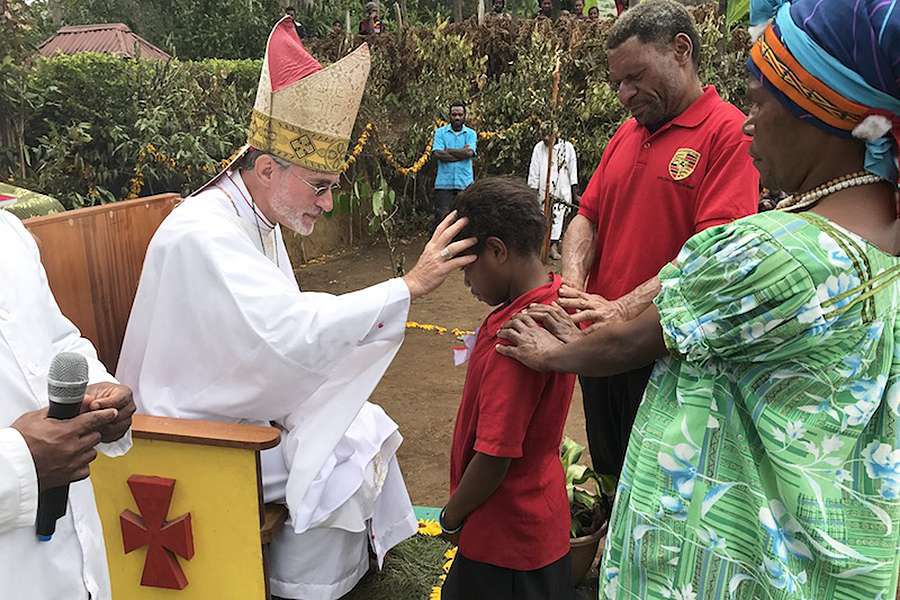A young Catholic diocese in the southern highlands of Papua New Guinea has a vibrant and growing faith, one which the people have embraced as their own, showing the universality of the Church, a local bishop says.
“To me it is really beautiful and it really expresses the catholicity of the Church, that the people have embraced the faith as something that is truly theirs, something that is truly meaningful to them,” Bishop Donald Lippert told CNA. “They don't look upon it as something foreign, as something coming from the outside. It is something that is very important to them and truly theirs.”
Bishop Lippert, an American Capuchin, has been working in Papua New Guinea for more than 10 years and has been bishop of the Diocese of Mendi, an area nestled in the mountains, in the southern highland region of Papua New Guinea, since 2012.
The Diocese of Mendi is young. When the first missionaries came to the area in the mid-1950s there were no Catholics. The diocese now has 80,000 Catholics — around 10 percent of the population. “We hope that will grow over the years. That’s what we’re there for,” he said.
One sign of the faith’s growth is the building of a new church in the pastoral area of Hedmari in August. Bishop Lippert, who traveled to the rural village to bless the new church, said that “the people were so happy.” The old church building had been falling into disrepair and the community was quickly outgrowing it. “The people themselves, without any help from the diocese, without any help from outside agencies, came together and built a beautiful church in a small little place,” he said. “I was amazed when I saw it for the first time.”
In general, the people of Papua New Guinea “are so happy when they can build a church, both in terms of the church building and in terms of the church as the people of God.”
Not a full-fledged parish yet, Bishop Lippert explained the people of Hedmari were not just constructing a church building, but were working to build the Church herself. “They are becoming more self-reliant in terms of financial things, they have active ministries going on there, they have parish leadership among the laity, and they have a very strong number of young people who are involved in the church,” he said. “Before long I’ll be able to go back there and open it up as a parish.”
The faith faces some difficulties too, however, one being the remoteness of the highlands. In Mendi, for example, only one small plane arrives per week. With poor infrastructure and bad roads, getting around can be a challenge. Other challenges include the lingering pagan beliefs of the people, many of which are steeped in witchcraft. But this is where the Church can step in, Bishop Lippert said.
“In fact, I think that is the most beautiful part,” he said. “They live in a society that is very chaotic and very unsure. And so the Church I think gives them a secure place to stand and can really help them to overcome some of the challenges that they might have.”
Of course no one is exempt from challenges, he pointed out, but it’s the faith that gives us the strength to carry on. He said that one of the greatest fruits of the Catholic faith he has witnessed in Papua New Guinea is freedom from fear. In the past many people “were afraid of evil spirits, they were afraid of tribal fighting,” he said. “Fear was a great motivator and very characteristic of their lives.” “But with the embracing of the Catholic faith, that fear is dissipating. Because they know the power of Jesus and the power of the Holy Spirit that can cast out any kind of evil, or any kind of fear that they might have.”
Even the bishop’s pectoral ‘Tau’ cross is a sign of the faith of the people of Papua New Guinea. “It was made by one of the local people for me out of a shell, a shell that used to be their money, the kina shell,” he said. “In fact the money today is still called a 'kina' so it was something very valuable for them.” “So he took one of these shells and was able to make this pectoral cross for me and gave it to me when I became a bishop; it's very unique and very beautiful I think.”

